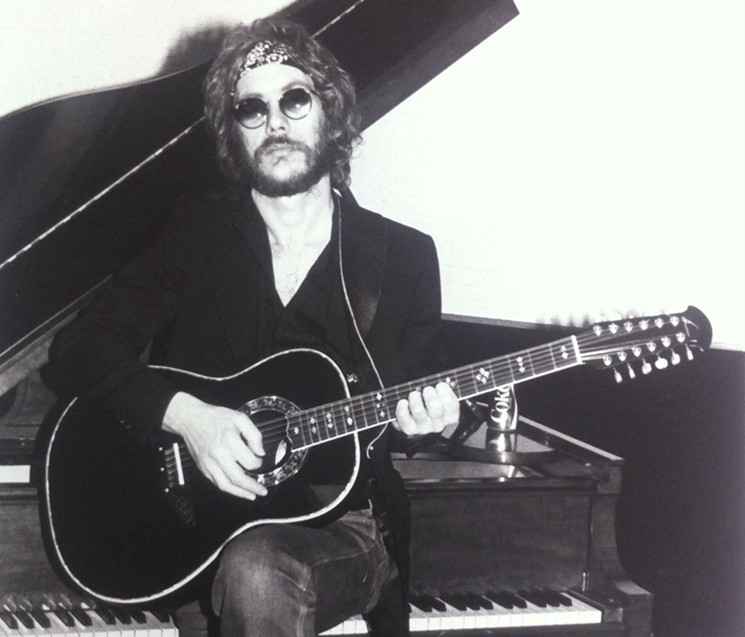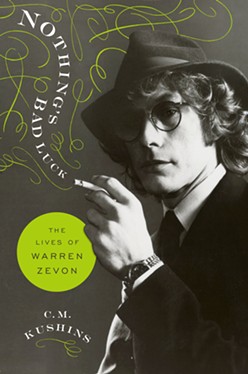
During his turbulent time in Philadelphia, Warren slowly began to mold his new “heavy metal folk” persona, circa 1984.
©2018 George Gruel. Courtesy of the private collection of George Gruel.
By C.M. Kushins
416 pp.
$29
Da Capo Press
Rejoice, admirers of Warren Zevon! It’s here.
While fans have been treated to a very good oral history, two tomes focusing on specific songs and albums, and even a photo book, Warren Zevon has never been the subject of a deep, rewarding and insightful biography of the late performer’s life and music. Until now. A decade in the making, C.M. Kushins’ book is an embarrassment of riches on the Excitable Boy, Mr. Bad Example, and a howling L.A. werewolf.
Young Warren’s first piano was a gift from his father. William “Stumpy” Zevon was an extroverted lower level mobster, gambler, gadfly, and rolling stone whose marriage to Warren’s mother – a woman half his age – was volatile and didn’t last. But he had great faith in his son’s early musical ability, and at times was his biggest cheerleader. Warren’s own musical influences were equal parts Fat Domino and Stockhausen.
His brand of literate, character-driven songs and fiery stage performances (sometimes fueled by, um, substances), made him a “cult” favorite and he was championed by more famous friends like the Eagles, Jackson Browne (an early and strong champion who Zevon viewed as a frenemy), and Linda Ronstadt – the last of whom covered several Zevon numbers, including “Poor Poor Pitiful Me.”
But as Kushins makes plain throughout, Warren Zevon could also be a selfish, abusive, entitled, and frustrating prick – burning bridges with the glee of an arsonist and being a general shit to friend and foe alike. And that only got worse with his prodigious drinking and drugging. But hey, if he didn’t remember what injuries he did to people or property the night before – then it never happened. And he could always cloak himself under the guise of Tortured Musical Genius to justify his actions to himself. With every bad incident and blown opportunity recounted, the reader wants to simply reach through the pages of the book and shake Zevon into snapping out of it.
“Both his life and his burgeoning career had slowly become defined by stretches of genuine warmth and creative genius, yet punctuated by jarring moments of extreme jealousy and ingratitude. In the end, Warren’s charm and intelligence would always win out, bringing back those closest to him time and time again,” Kushins writes. “Warren’s tendency to allow someone else to foot the bills and responsibilities, leaving him free to focus his creative energies, would become a trend throughout his life.”
The story of his most famous hit “Werewolves of London” is familiar. Former employer Phil Everly of the Everly Brothers challenged Zevon to write song that would inspire a dance craze, based on a 1935 horror movie he’d seen called Werewolf of London.
A drunken writing session with friends LeRoy Marinell and guitarist Waddy Wachtel (who first blurted out the inspirational “Aah-oooh!” scream) ensued, with lyrics getting wilder and wackier. Twenty minutes later, it was done. And when it came time to record it, Zevon and the band put down 60 takes. They ended up using the second one on the album.

Warren at his Yamaha grand piano. Road manager George Gruel recalled laying under the piano, smoking a joint, and listening to Warren lose himself in his long-in-progress symphony.
©2018 George Gruel. Courtesy of the private collection of George Gruel.
Houston makes a brief appearance in a description from a solo show at Rockefeller’s in the mid-‘80s where he played very early versions of new songs including “Detox Mansion,” “Reconsider Me,” and “The Factory.”
All would appear on his “comeback” record, 1987’s Sentimental Hygiene. It was shepherded by his new manager and superfan Andy Slater. Zevon had finally quit drinking the year before, and wouldn’t touch alcohol again for another 17 years (Zevon was fond of telling interviewers “I lived like Jim Morrison longer than he did.”).
In addition to archival research, Kushins conducted interviews with many of Zevon’s friends, collaborators, relatives, and writers, including ex-wife Crystal Zevon (though not his children, Ariel and Jordan).
Most revealingly, he talked to a series of girlfriends, each of whom added another piece to the overall puzzle of Zevon’s personality, ups and downs, OCD, and quirky habits. In the ‘80s and ‘90s he reinvented his stage show and toured constantly while trying to land record deals. It’s a period which is usually forgotten, and Kushins does great service in his detailing here. The book’s title comes from a phrase the luck-obsessed musician would frequently spout.
When Zevon was diagnosed with mesothelioma in 2002, he was given three months to live. Working at a feverish pace, he completed with the help of many guest stars his final album. The Wind was steeped in mortality and death, with the last song he sang on the appropriate “Keep Me in Your Heart.” Friend David Letterman had him as the only guest on a special episode of his show. And though Zevon outlived his original diagnosis, he passed in 2003.
Kushins has done a masterful job with this book, exposing readers to as much about the man as his music. Fans have been campaigning for years to get Zevon at least on the ballot for the Rock and Roll Hall of Fame. Hopefully, this book will bring some much warranted attention to the man whose advice to the living as he was dying was to simply “enjoy every sandwich.”








